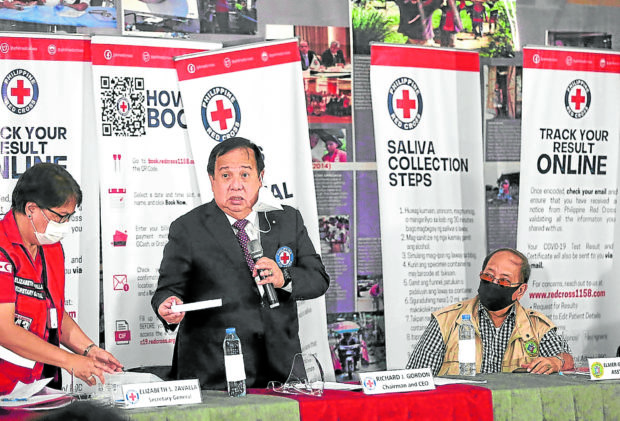
CHEAPER TEST Philippine Red Cross chair and CEO Richard Gordon leads the saliva test launching in Mandaluyong City on Monday. —NINO JESUS ORBETA
MANILA, Philippines — Filipinos now have a choice to get accurately tested for the new coronavirus without fear of having to endure nasopharyngeal swab tests after the Philippine Red Cross (PRC) on Monday formally launched its saliva polymerase chain reaction (PCR) test.
Michael Tee, lead researcher for the saliva test, said the new procedure was 98.23-percent accurate compared with the RT-PCR swab test, which had a 99-percent accuracy rate.
This meant that 98.23 percent of those who underwent saliva and swab tests saw the same results in both, Tee explained.
Since the saliva test would also be processed by the same reverse transcription-PCR (RT-PCR) machines used in swab test samples, PRC chair and CEO Richard Gordon explained that the PRC could double the number of tests its molecular laboratories were processing daily.
“Testing is so important. After we conduct tests, we can immediately isolate those who are sick so we can prevent the spread of the virus. Then we can also treat [the patient], especially if the virus was detected early,” Gordon said.
Currently, the PRC has 13 molecular laboratories in the country that can process 9,000 tests daily, but Gordon clarified that this number could easily be doubled once Filipinos opt to undergo the saliva test.
Those interested in getting a saliva test must book an appointment through book.redcross1158.com, choose a location and date for the test.
But those who want to undergo the saliva test must not eat, drink, gargle or smoke cigarettes and e-cigarettes 30 minutes before they are tested.
At the testing sites, they would be given a sterilized container with a barcode and a funnel, which they can use to transfer about 1 to 2 milliliters of their saliva, unlike the “more invasive” swab test.
Experts added that the saliva test would be significantly cheaper at P2,000 compared with nasal swab tests that cost at least P3,800. INQ